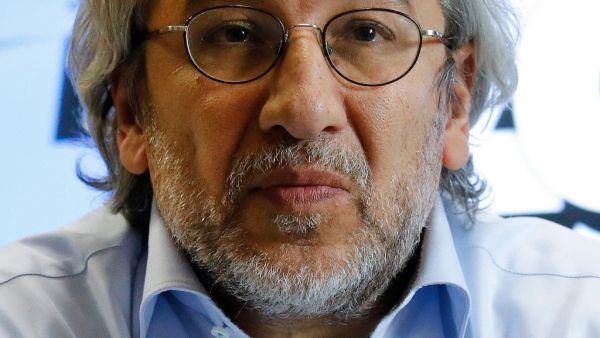The European Union on Friday warned Turkey that a heavy jail sentence imposed on journalist Can Dundar harmed both human rights in the country and Ankara’s relations with Brussels.
A Turkish court on Wednesday sentenced the exiled former editor-in-chief of the respected Cumhuriyet daily to more than 27 years in jail on espionage and terror charges.
Can Dundar fled to Germany in 2016 after a failed coup the Turkish government blames on US-based Muslim cleric Fethullah Gulen.
#EU warns #Turkey that a heavy jail sentence imposed on journalist Can Dundar harmed both human rights in the country and Ankara’s relations with Brussels.https://t.co/zdUL0XLfUo
— Al Arabiya English (@AlArabiya_Eng) December 26, 2020
“The European Union has repeatedly conveyed its serious concerns about continued negative developments as regards the rule of law, fundamental rights and the judiciary in Turkey,” a statement issued by the EU’s external affairs arm said.
“The decision of a Turkish Court to sentence journalist Can Dundar for what is his fundamental right to freedom of expression and (businessman) Osman Kavala’s continuous pre-trial detention go, regrettably, in the opposite direction,” it said.
“As a candidate (member) country and long-standing member of the Council of Europe, Turkey urgently needs to make concrete and sustained progress in the respect of fundamental rights, which are a cornerstone of EU-Turkey relations,” it added.
Relations between the EU and Turkey have been badly strained over a host of issues in recent years and Brussels was notably critical of President Recep Tayyip Erdogan’s harsh post-coup crackdown.
There are regular exchanges, especially over human rights, which Ankara says reflect EU double-standards and amount to interference in its internal affairs.
Turkey’s EU membership application meanwhile has stalled amid the resulting acrimony.
Turkish covert op
The court found Can Dundar guilty in connection with an article about an alleged Turkish arms shipment to Syrian militants fighting President Bashar al-Assad.
He was sentenced to 18 years and nine months for “securing confidential information for espionage” and eight years and nine months for “aiding a terrorist group” led by Gulen.
The Turkish government blames the cleric for orchestrating a 2016 coup attempt against President Recep Tayyip Erdogan.
Dundar called the ruling a political “vendetta” organised against him by Erdogan.
The Turkish leader had warned Dundar that he would “pay a heavy price” when the story was first published together with an accompanying video of the alleged weapons supplies in 2015.
A Turkish court has convicted Can Dundar, a Turkish journalist now in Germany, on espionage and terror-related charges for a news report #turkey https://t.co/mFpt97lP1c pic.twitter.com/2dKSk5poZx
— TUBITAC.com (@Tubitac_com) December 25, 2020
“This is a political decision, a vendetta which has nothing to do with law,” Dundar told AFP by phone from Germany.
“Erdogan already warned me that I would pay a price. Now he is trying to have me pay a price.”
The Cumhuriyet daily’s hard-hitting articles have often irritated Erdogan’s government and the paper’s reporters have routinely ended up in court.
The country’s oldest daily — which means “Republic” in Turkish — was founded in 1924 and remains one of the few media outlets not controlled by government-allied tycoons.
Dundar was first jailed in 2015 over the paper’s allegations that Turkey’s MIT intelligence service was funneling weapons to Syrian radical insurgents in trucks packed with boxes marked up as carrying medical supplies.
Turkey vocally opposed Assad’s regime but the story appeared to reveal a covert military operation.
He was sentenced to nearly six years in May 2016 for “obtaining and disclosing classified documents related to the security of the state” but released pending an appeal.
The 59-year-old was shot at by an assailant outside Istanbul’s main courthouse during that hearing.
Dundar fled to Germany later that same year and the gunman was sentenced to 10 months in jail.
The Supreme Court of Appeals reversed Dundar’s conviction in 2018. The Istanbul court then began his retrial.
Turkish authorities have already requested Dundar’s extradition from Germany.
International criticism
Rights groups routinely accuse Turkey of undermining press freedom by arresting journalists and shutting down critical media outlets.
The US-based Committee to Protect Journalists listed Turkey as one of the top jailers after China in its annual global report last week.
It found 37 journalists were imprisoned this year — less than half the number arrested in 2016 around the time of the coup attempt.
“What can we think of a judicial system that sentences a journalist to such a heavy sentence for simply doing his job?” the European Federation of Journalists’ chief Ricardo Gutierrez asked.
Pauline Ades-Mevel of Reporters Without Borders (RSF) said Dundar’s case “illustrates to the highest degree” the judicial harassment faced by journalists in Turkey.
“This is a senseless and despicable decision that confirms that President Erdogan’s regime does not know how to stop in its authoritarian headlong rush,” she said.
But Erdogan’s media aide Fahrettin Altun tweeted that calling Dundar “a journalist — and his sentence, a blow to free speech — is an insult to real journalists everywhere”.
Dundar’s lawyers boycotted Wednesday’s hearing because they did not believe they would get a fair trial.
“These are show trials,” his lawyer Tora Pekin said.
This article has been adapted from its original source.








